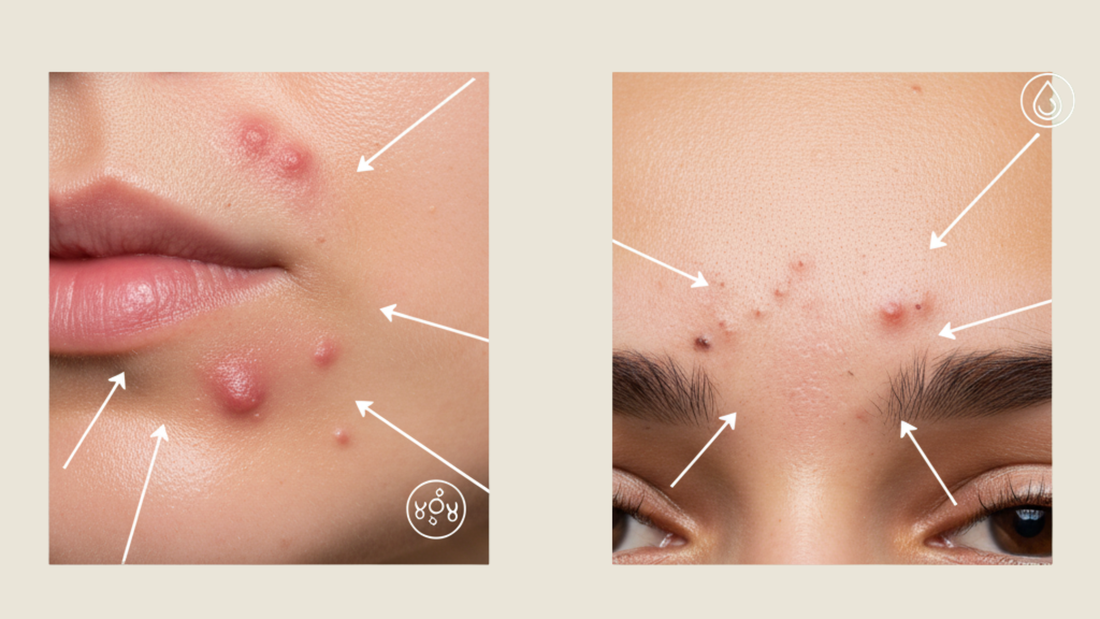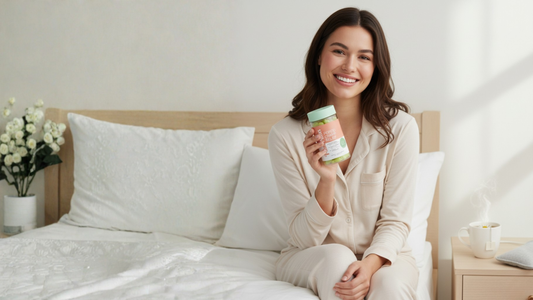
Is Period Acne Different From Regular Acne? Understanding the Connection Between Hormones and Breakouts
Share
Period Acne vs Regular Acne: Causes, Triggers, and Natural Remedies
Acne is the most common skin condition on the planet, but not all acne is created equal. If you have found pimples erupting like clockwork around or at your menstrual cycle, then you're probably with period acne. While sporadic breakouts appear at any moment, period acne goes with cyclic hormonal shifts.
Learn how period acne is different from regular acne so you can better control flare-ups and prevent the frustration of persistent breakouts. It also provides you with tools to collaborate with your cycle rather than at its mercy.

What Is Period Acne and How Does It Start?
Period acne is a form of hormonal acne that appears in the menstrual cycle, typically one to two weeks before their period. Breakouts are brought about by hormonal changes in estrogen, progesterone, and testosterone.
As the progesterone increases, oil glands in the face increase the secretion of sebum. Testosterone contributes to worsening the situation by over-stimulating glands, and as the estrogen decreases, stripping some of the natural skin barrier. Clogged pores, redness, and sore pimples ensue.
Symptoms of menstruation breakouts are:
- Deep, cystic acne on the jawline and chin.
- Breakouts that occur around the time of or shortly before your period.
- Spontaneous resolution after menstruation.
- A cyclical monthly pattern.
Period Acne vs Regular Acne: What Makes Them Different?
Although they may appear identical on the surface, period acne and regular acne are different in some very fundamental ways.
-
Root Cause
- Period acne: Secondary to cyclical hormonal fluctuations.
- Regular acne: Caused by genetics, bacteria, plugged pores, poor skin care, or lifestyle.
-
Timing
- Period acne: Related to the menstrual cycle.
- Regular acne: Can take place at any time and is not connected with monthly changes.
-
Location
- Period acne: Occurs primarily on the chin, jaw, and lower cheeks.
- Regular acne: Occurs on the forehead, back, chest, and shoulders.
-
Type of Pimples
- Period acne: Larger and cystic, and painful.
- Regular acne: A Combination of blackheads, whiteheads, pustules, and smaller acne pimples.
Dermatologists typically describe period acne as a unique type of hormonal acne American Academy of Dermatology, 2023.

Why Hormones Play Such a Big Role in Period Acne
Hormones are chemical messengers in the body, and they have a significant impact on how much oil the skin makes. This is what occurs in the several days leading up to your period:
- Progesterone Spikes – Oil glands work overtime, leading to clogged pores.
- Testosterone Influence – Stimulates sebaceous glands even more, creating deeper pimples.
- Estrogen Drops – With less estrogen, the skin loses anti-inflammatory protection.
This three-step process explains why menstrual breakouts are often more painful, longer-lasting, and more predictable than everyday pimples.
Can Period Acne and Regular Acne Overlap?
Yes. Many people experience both at the same time. For example, you might deal with regular blackheads on your forehead from oily skin while also experiencing painful cysts on your jawline during your cycle.
This overlap can make acne harder to manage unless you track your skin alongside your menstrual cycle. Using apps like Clue or Flo can help reveal patterns and show whether your acne is hormonal, lifestyle-related, or a combination of both.
Managing and Treating Period Acne Naturally and Professionally
While you can’t stop hormones from shifting, you can manage their effects with the right approach.
Skincare Adjustments for Menstrual Breakouts
- Use a gentle, non-comedogenic cleanser twice daily.
- Add salicylic acid or benzoyl peroxide before your period to unclog pores and fight bacteria (Mayo Clinic, 2023).
- Try retinoids (if tolerated) to prevent clogged pores and promote cell turnover.
- Always hydrate with an oil-free moisturizer to protect the skin barrier.
Hormone-Supportive Lifestyle Shifts
- Eat more anti-inflammatory foods like leafy greens, berries, and fatty fish.
- Cut back on refined sugar and dairy, which may worsen hormonal acne (Harvard Health, 2022).
- Stay hydrated and prioritize sleep for balanced hormone function.
- Reduce stress with yoga, meditation, or journaling to prevent cortisol spikes.
Proactive Treatment Timing
Apply acne treatments a week before your period starts to help minimize flare-ups.
Professional Options
- Birth control pills to regulate hormones.
- Spironolactone to block androgen effects.
- Prescription retinoids or antibiotics for severe acne.
Some women find relief with natural remedies and wellness support in addition to skincare:
- Turmeric: A natural anti-inflammatory that can reduce redness.
- Apple cider vinegar gummies: May support digestion and skin balance.
- Probiotics: Improve gut health, which is connected to clearer skin.
- Spearmint tea: Some research suggests it lowers androgen activity, reducing hormonal acne.
- Pumpums Menstrual Relief Gummies While designed to ease cramps, bloating, and hydration issues, supporting your overall menstrual health can also help reduce skin flare-ups indirectly by lowering inflammation and stress.
Period Acne vs Regular Acne
Period acne is often considered a form of hormonal acne, triggered by the natural rise and fall of estrogen and progesterone during the menstrual cycle. These hormonal changes can increase oil production, inflammation, and clogged pores—leading to breakouts that usually appear on the chin, jawline, and lower face around your period.
Regular acne, on the other hand, may be caused by a wider range of factors such as diet, stress, skincare habits, or genetics. While both look similar, knowing whether your breakouts are hormonal can help guide treatment. Supporting your body through hydration, nutrition, and products like Pumpums Menstrual Relief Gummies, which combine electrolytes, apple cider vinegar, and a unique Pickle+ blend, can help ease menstrual symptoms that often worsen skin flare-ups.
Understanding and Managing Period Acne vs Regular Acne
Yes, period acne is different from regular acne. Period acne is hormone-driven, cyclical, and often more painful, while regular acne can stem from genetics, bacteria, or daily habits. Recognizing which type you have allows you to choose the best treatments, from skincare adjustments to lifestyle changes.
Your skin is part of your body’s monthly rhythm. Instead of dreading period acne, see it as a signal of hormonal shifts. By proactively supporting your skin, balancing your lifestyle, and using menstrual wellness aids like PumPums Menstrual Relief Gummies, you can feel more in control of your cycle—and your confidence.




